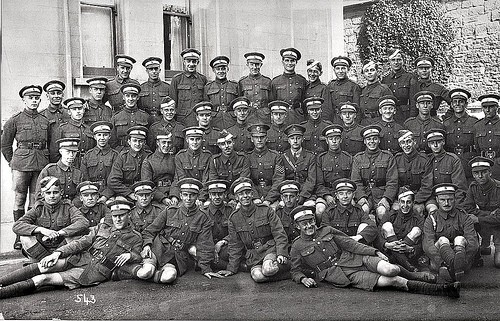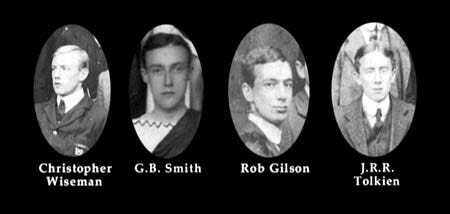Recently in The Times, Richard Morrison discussed, “The musicians silenced in the carnage of the Great War,” this being the centennial year of World War I. Morrison explored the war’s, “cataclysmic effect on the musical world,” and how “it left an indelible mark on musical composition — partly because almost a whole generation of brilliant young composers were killed, and partly because those that survived were changed for ever.” Morrison ends on a poignant note:
“As with so many of that horribly ill-fated generation, you wonder what might have been — had mankind not slaughtered so many of its brightest and best.”
This sentiment can be extended beyond music to all fields of human endeavor. Every life is precious for its own sake, but we can only have a full accounting of the costs of war if we also reflect upon the squandered potential of its victims.
Of course we can never know exactly what was lost to civilization in a war, but one way of getting an idea is to consider what we almost lost.
For example, World War I might have easily cost us most of the contributions of Ludwig von Mises, the greatest economist, and one of the greatest champions of liberty, who ever lived. In his wonderful biography of Mises, Guido Hülsmann wrote of how much danger Mises was in as an artillery officer on Austria-Hungary’s Northern Front.
“Artillery was not only the main agent of destruction, but also one of its prime targets. Mises’s battery constantly had to change position, often under fire. Heavy rainfall set in, hampered their movements, and proved that k.u.k. uniforms were not waterproof.”
As I have written in my biographical essay about Mises, this was an incredibly close call for humanity:
“One of history’s greatest geniuses was a single air burst away from having his career nipped in the bud.
How tragic that would have been! Mises had not yet even written his great 1920 essay Economic Calculation in the Socialist Commonwealth, which contained the single most powerful argument against central planning that had ever been formulated.”
Neither had he yet elaborated the true, praxeological foundation of sound economics (which he would accomplish in the 1930s) or reconstructed on that foundation the entire edifice of economics as a rigorous, systematic, and complete science of the market (which he would accomplish in the 1940s). Imagine how subsequent Austrian economists would be have had to grope in the dark had he never made those discoveries. There would have been no Socialism: An Economic and Sociological Analysis, a book that forever changed the life and career of Friedrich Hayek (who also might have died in the World War I), and no Human Action, a book that forever changed the life and career of Murray Rothbard .
Mises himself was almost a tragic example of a phenomenon he would do so much to illuminate: the state’s calamitous misallocation of resources. In all their wisdom, the planners in Vienna decided that the mind that had already formulated the Austrian Theory of the Business Cycle and would soon discover the Socialist Calculation Problem was best employed figuring out how to effectively blow up Russians, and that the hand that would later pen Human Action might just as well instead lie cold and dead somewhere in the Carpathian Mountains.
Another such near-tragic misallocation, one made on the other side of the same war, was that of J.R.R. Tolkien, who would later author the beloved epic The Lord of the Rings. The lore of Middle-earth, still germinating in Tolkien’s imagination—a narrative world that would mold an entire genre and bring joy to millions of readers and movie-goers—might have been snuffed out unwritten in the Battle of the Somme.
Source: Governors of the Schools of King Edward VI in Birmingham, via John Garth. Garth’s caption: “A face in the crowd: Tolkien, fourth from left in the middle row, stands for inspection with the new Cadet Corps at King Edward’s School, Birmingham, on 4 April 1907″
Luckily, Mises and Tolkien survived the awful war. But what of those who did not? How many Miseses and Tolkiens laid dead in the trenches? How much bourgeoning genius was nipped in the bud?
Again, we can never know the answer to this question, but we can get an even better idea by also reflecting on the war casualty rates in the circles of these great men.
Hülsmann wrote wistfully of the pre-War intellectual ferment at Mises’s University of Vienna, and of its tragic end (emphasis added).
“What glorious days when one could study under Böhm-Bawerk, Wieser, Philippovich, and Mises! But these days were numbered. The all-star Austrian faculty lasted only three semesters. In August 1914, Böhm-Bawerk died and Mises was sent to the front. His best students perished in the war.”
And before the War, Tolkien had enjoyed a deep and inspiring camaraderie as one of four friends in a tight literary circle called the Tea Club Barrovian Society (T.C.B.S.). As John Garth wrote earlier this year in The Daily Beast:
“They dreamed of making art that would create a better world, and for Tolkien a T.C.B.S. gathering in December that year was followed by ‘finding a voice for all kinds of pent up things and a tremendous opening up of everything’ — the beginning of Middle-earth.”
But the dreams and lives of this circle were to be almost entirely devoured by the nightmare of the Great War. On July 15, 1916, T.C.B.S. member Geoffrey Smith wrote to Tolkien of the death of another member, Robert Gilson:
I saw in the paper this morning that Rob has been killed. I am safe but what does that matter? Do please stick to me, you and Christopher. I am very tired and most frightfully depressed at this worst news. Now one realises in despair what the T.C.B.S. really was.
Five months later, Smith too was killed. Just before setting off for his fatal mission, Smith wrote Tolkien one last letter that is truly heart-rending:
My chief consolation is that if I am scuppered tonight — I am off on duty in a few minutes — there will still be left a member of the great T.C.B.S. to voice what I dreamed and what we all agreed upon. For the death of one of its members cannot, I am determined, dissolve the T.C.B.S. Death can make us loathsome and helpless as individuals, but it cannot put an end to the immortal four! A discovery I am going to communicate to Rob before I go off tonight. And do you write it also to Christopher. May God bless you my dear John Ronald and may you say things I have tried to say long after I am not there to say them if such be my lot.
Fortunately for us, John Ronald did get to say those things. But what did Geoffrey never get to say? We will never know, but surely it would have been something splendid and profound, given the greatness of soul evinced in these letters and that he must have had to be so inspiring to Tolkien. And what did Mises’s “best students” never get to say about markets and human society?
To paraphrase Robin Williams’s John Keating in the film Dead Poet’s Society:They’re not that different from you, are they? They believe they’re destined for great things, just like many of you. Their eyes are full of hope, just like you. Because you see gentlemen, these boys are now fertilizing daffodils. But if you listen real close, you can hear them whisper their legacy to you. Go on, lean in. “Stop the wars, boys.”
Here we are, a century later, and the Washington-driven western hegemony that emerged from the World Wars is afflicted with the same imperialistic hubris and entangled in the same kind of “collective security” tripwires that detonated the conflagration that almost consumed Mises and Tolkien, and that didconsume Mises’s best students and Tolkien’s best colleagues. President Barack Obama has not only just relaunched the very war in Iraq that he was elected to get us out of (much as Woodrow Wilson dragged us into World War I after winning re-election with the slogan “He kept us out of war”), but, unbelievably, has embroiled us in a proxy war with nuclear Russia. Just yesterday, a member of the Ukrainian junta serving as Washington’s proxy darkly insisted that yet another “great war has arrived at our doorstep,” in which “tens of thousands” could die. And the neocons (like Victoria Nuland, who started the whole mess), “humanitarian” interventionists (like Susan Rice), and bumblers (like John Kerry) guiding Obama’s foreign policy seem to be doing everything they can to realize that unthinkable outcome: cheered on, of course, by the war drum beaters in the media.
How much unrealized genius already lies under the rubble in Donetsk, or in other urban centers demolished by American-supplied weapons like Gaza and Aleppo? How many dancers, doctors, and dreamers will never come to be? And how many times over will that number grow if we don’t finally stand up to the warmongers and war makers before it’s too late: before world conflict once again spins completely out of control as it did a hundred years ago?








 del.icio.us
del.icio.us
 Digg
Digg